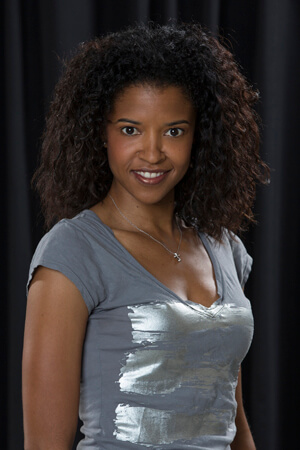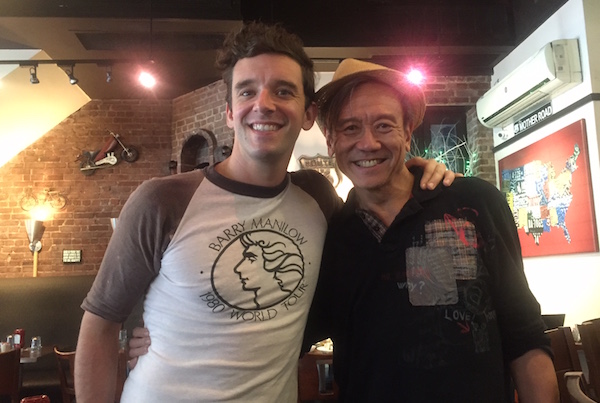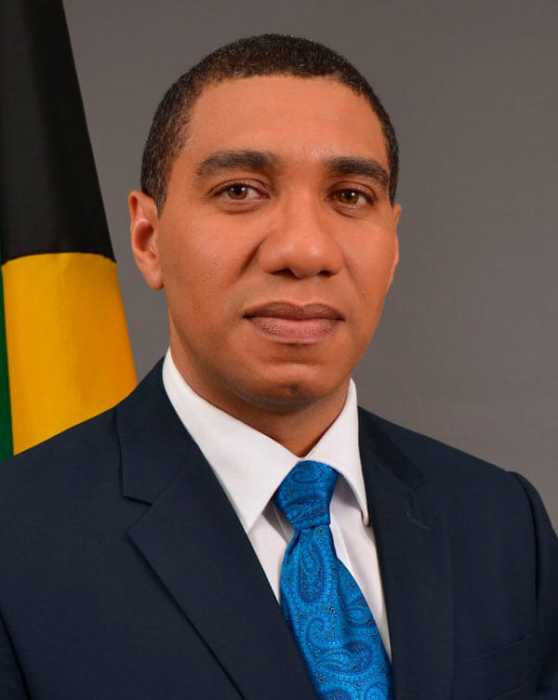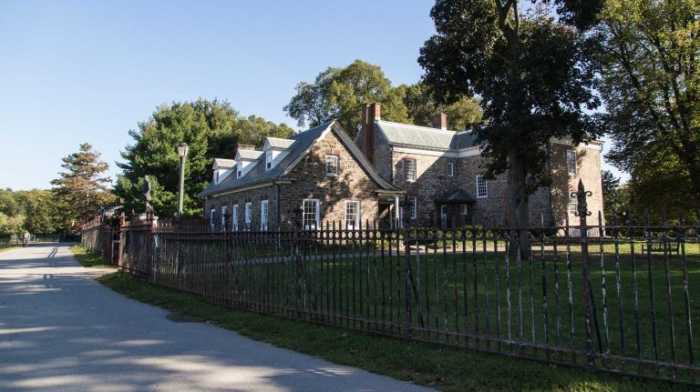Randy Harrison stars in the Primary Stages production of Chad Beguelin's “Harbor” through September 8. | PRIMARY STAGES
Randy Harrison is forever burned into the consciousness of a gay generation for playing Justin Taylor, the ultimate irresistibly innocent twink on the groundbreaking TV series “Queer as Folk.” Since that show wrapped in 2005, he’s carved out a solid theatrical career for himself in New York and regionally, and is now appearing in Chad Beguelin's play “Harbor” for Primary Stages (59E59 Theaters, 59 E. 59th St., through Sep. 8; primarystages.org/harbor). Meeting him, I had to ask where he kept his Dorian Gray portrait because damn!, he still looks so young.
“Oh, you can still be a twink when you’re 35!” he laughed. “It just takes a lot of caffeine and a lot of alcohol! But I love this play, so funny, sweet, and touching, about a well-off married gay couple in Sag Harbor. I’m a struggling writer, sort of kept by my successful architect husband, and I’ve run away from an abusive, white trash past. My estranged sister shows up with her teenaged daughter I haven’t seen in over 10 years, and our cozy system is sort of shattered. It’s real people struggling with real stuff. I’d read the script a few years when they did it out of town and I loved it, so when the audition came around I said, ‘I know this part!’ So excited to be doing it with a great cast and the rehearsals are so mellow and fun.”
Originally from New Hampshire and Georgia, Harrison started acting in community theater when he was six, was schooled in Ohio and, after a toe-dabble in Los Angeles, is now a firmly based New Yorker. “Queer as Folk” happened shortly after he moved here at 22: “I was freelancing with an agent and was doing a showcase when I auditioned for it on tape, as most of it was being cast in LA. The New York casting director hadn’t even marked my tape for the show’s producers to watch, but they accidentally somehow saw it and said, ‘This is the guy.’
After “Queer,” a triple threat’s long-awaited star turn
“They flew me out twice. I didn’t do well in that showcase and was doing theater in St. Louis, thinking of moving to LA. I had never been and thought it was all a fluke, but a chance to visit LA for free, and somehow I booked it. It lasted five years, a really good gig in Toronto, which was a blessing and a curse. Good in that it brought us all together. We were all displaced and for most of us, it was our first big job, so we bonded. The crew was amazing and we had great Canadian independent film directors. The curse was we were there from September to April every year, so cold. I love Toronto, but I wasn’t in LA or New York and unable to begin a career outside of the show. Once those five years were up, I had to start from scratch here, which definitely makes me feel like I’ve earned where I’ve gotten to.
“We in the original cast see each other periodically. Every once in a while people pay to do these events where we all do meet-and-greets with fans, so we see each other once a year doing that. Our fan base is intense, not what was back then when we’d do crazy tours at Tower Records with DVDs, such a scene, but a lot of Europeans come, from the showings over there. Much more so than for the original UK version of the show, which I don’t think got out of that country much, and we also apparently have a big fan base in South and Central America.”
I went to an early New York Times sponsored “Queer” event and was startled by how seriously the fans took it: “Yeah, it was their life. They thought we were the characters, but now it’s maybe been a long enough time and I’ve aged enough. But, yeah, some people still think I’m Justin!
“I never had any real bad stalkers but I do get scared when people get your home address and it’s on the Internet. Sometimes pictures pop of me on the subway, reading sides for my auditions, and that makes you feel violated, but generally they’re lovely supportive people who come to see my shows and those of people I’ve worked with. I don’t get recognized often anymore, but that depends on where I am. In New York, people just don’t care if they do, which is nice, unless I’m in Times Square and then, yeah, it’s ‘Hey, Justin!’
“I’ve been out since I was 15 and the other day I realized it’s been 20 years! I was out way before I did the show and never thought I’d be interviewed or on TV. I remember a Showtime publicist saying, ‘You don’t have to do this’ and thinking, ‘Why would I want to go back in the closet now?’ It was so hard to come out and such a good thing to do, especially the nature of the show was all about this. Growing up, I didn’t have many people who were out, so it was important for me to be one of those people if I ever had the chance.”
Harrison is amazed by the recent amount of change that’s happened since “Queer” and hopeful, but says he and his cast members “joke about how we’re the black sheep of gayness because we never get mentioned like ‘Will and Grace’ or ‘Ellen.’ Everybody seems to ignore the fact that we ever happened. I don’t know why.”
The show was also far bolder in sexual content than those others, and, indeed, more so than anything being done on network TV today, which favors gays being sexless, snappy wisecrackers and parents over them seen nude and lip-locked. I mentioned to Harrison that “Queer”’s overt nudity had me knowing his butt better than my own and he laughed, “It was crazy. It was easy in the beginning because I felt like it was so important that there be this visibility and gay sexuality put on TV so people could see it, especially those who were coming out.
“So, even though — I don’t want to use the word ‘gratuitous’ — it was excessive, I felt that was intentional. We were gonna put this in your face because there hadn’t been enough out there, so I felt like socially and politically it was important. Five years down the line, though, you’re like, ‘Are you fucking serious? Haven’t we had enough of this?’ I was happy to do it, but I will never do a show with that kind of sexual content again, done with that.”
Harrison has a partner but wasn’t into talking about him “because I talked about my relationships in the past and got attacked. I’m very happy with my partner now and maybe things are different now, but then a lot of fans fantasized that Gale Harold and I were actually together, and got vicious with my pictures all over the Internet with things drawn over my face. So I want to spare my current partner all of that.”
Renée Elise Goldsberry stars in the Encores! Off-Center’s revival of Gretchen Cryer and Nancy Ford’s “I’m Getting My Act Together and Taking It On the Road.” | MATT KARAS
The stunning Renée Elise Goldsberry is a true triple threat talent, who’s dazzled me in her career-making “Two Gentlemen of Verona” and the brilliant “Good People,” and is currently on TV’s “The Good Wife.” It is now her time to really take center stage as a full-out star in the Encores! Off-Center’s revival of Gretchen Cryer and Nancy Ford’s “I’m Getting My Act Together and Taking It On the Road” (131 W. 55th St., through Jul. 27; nycitycenter.org).
“This is one of those experiences,” she told me, “where you think you know it’s gonna be great and you show up the first day and realize that this is so much greater than you’d thought it would be. I met Gretchen and Nancy yesterday, these amazing powerhouse women who were a duo in 1978. They’d had a couple of albums and were touring with the idea of how to give voice to what was happening to women at the time. During a club set, Gretchen came up with the title, turned to Nancy and said, ‘I got it. We’re gonna do it like a woman just got a new act and is showing it to her manager during a sound check before the big night.’ It just came to her between songs, and then they kept on singing.
“It’s about Heather Jones, who has been dropped from her label, is divorced and a single mom with two kids, and makes the decision to change her act. But her manager, Joe [Frederick Weller, who did a workshop of ‘The Bodyguard’ musical with Goldsberry], doesn’t agree with her decision to let her hair grow, tell how old she is, and talk about being a single mom and her frustrating relationships with men — nothing marketable.”
The show was not well reviewed in 1978, but producer Joe Papp believed in it and it became an audience success, which spoke for a generation of women, many of whom Goldsberry is meeting, who know every word of it and are thrilled it’s being revived.
“It naturally fits vocally right where I live,” she said, “and I have a feeling I may be the one with the mic, but it might turn into one big singalong, which I would love!”
The show was written by white women originally for a white woman, and Goldsberry said, “I don’t think [director] Kathleen Marshall even thought we were making a statement when I was cast. I do think that way about roles when I have an opportunity to go in — is this a wise creative casting decision? But Kathleen just casts people who are good at doing things, and this role was done by different women who all did their own thing.”
I told Goldsberry that this was really going to finally be her New York star turn after so much magnificent ensemble acting, and she said, “Is it? You’re stressing me out! [laughs] ‘Two Gentleman’ was directed by Kathleen, one of the most exciting moments of my career, fit like a glove. I do think she’s a star-maker although she doesn’t get enough credit for it. I got a lot of attention in that for doing exactly what she told me to do!
“It’s only Tuesday and I have a lot to learn, but I get peace from the fact that I don’t think I would be here if I couldn’t do it. One thing about all my favorite directors is that they know everybody and can get anybody they want, so if Kathleen or Daniel Sullivan or Michael Greif asks me to do something, I guess I can do it, so I better just calm down!”
Contact David Noh at Inthenoh@aol.com, follow him on Facebook and Twitter @in_the_noh, and check out his blog at http://nohway.wordpress.com/.







































